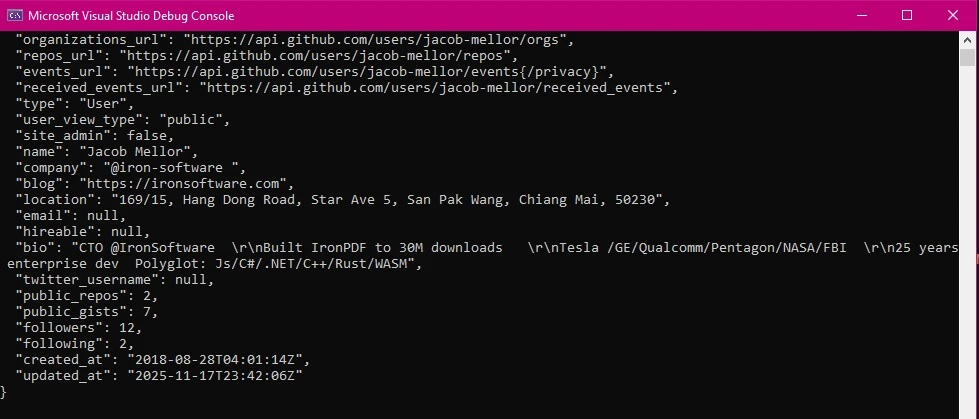C# Global Variable (How it Works for Developers)
Global variables are a powerful tool in programming, enabling the storage of data that needs to be accessed across different parts of an application. While C# does not natively support true global variables, it offers alternatives such as static variables, constants, and dependency injection to achieve similar functionality.
Today, we will be taking a closer look at managing global variables, while simultaneously exploring IronPDF. This robust library allows developers to create, edit, and manipulate PDF files directly from C# code. Integrating global variables with IronPDF can streamline the process of including shared data like headers, footers, and branding in every generated PDF.
Understanding Global Variables in C#
What Are Global Variables?
Global variables are variables that can be accessed from any part of the application. They store data that needs to be shared across multiple methods, classes, or modules. However, in C#, there is no such thing as global variables like in some other programming languages, such as Python's "global" keyword. Instead, you can simulate global variables using static fields, constants, or dependency injection, which, depending on your personal experience, can be an easy process.
- Static Variables: Variables that belong to the class itself, rather than instances of the class. These variables retain their value across multiple calls and can be accessed globally.
- Constants: Immutable values that are defined at compile-time and can be accessed globally.
- Dependency Injection: A design pattern that allows objects to be passed as dependencies, providing controlled access to shared data.
Common Use Cases for Global Variables
Global variables are typically used in scenarios where you need to store data that will be used across various parts of the application. Common use cases include:
- Configuration Settings: Global variables can store app-wide configuration data like API keys or database connection strings.
- Shared Resources: Assets like file paths, images, or templates that are used across different modules.
- Session Data: Data that needs to persist across multiple sessions or transactions.
It is essential to manage global variables carefully. Overuse can lead to tight coupling between components, making your code harder to maintain and test.
Creating and Using Global Variables in C#
First, let's take a look at how we can create a global variable in C#, working around the lack of any native global variables using the static keyword and a static class.
// Our globals class
public class GlobalSettings
{
// Static variables accessible globally
public static string CompanyName = "IronSoftware";
public static string LogoPath = "IronPdfLogo.png";
}
class Program
{
static void Main(string[] args)
{
// Access global variables
Console.WriteLine(GlobalSettings.CompanyName);
}
}// Our globals class
public class GlobalSettings
{
// Static variables accessible globally
public static string CompanyName = "IronSoftware";
public static string LogoPath = "IronPdfLogo.png";
}
class Program
{
static void Main(string[] args)
{
// Access global variables
Console.WriteLine(GlobalSettings.CompanyName);
}
}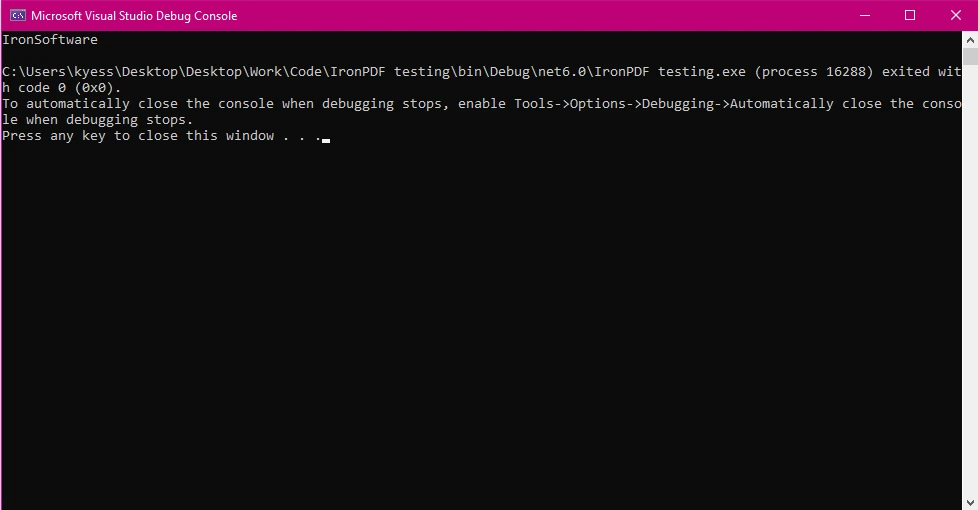
In the above example, we have created a public class called GlobalSettings which houses our global variables, CompanyName and LogoPath. Then, we access the CompanyName variable in our main method using GlobalSettings.CompanyName.
Integrating Global Variables with IronPDF for PDF Generation
Setting Up IronPDF in Your .NET Project
To start using IronPDF, you will first need to install it. If it's already installed, then you can skip to the next section, otherwise the following steps cover how to install the IronPDF library.
Via the NuGet Package Manager Console
To install IronPDF using the NuGet Package Manager Console, open Visual Studio and navigate to the Package Manager Console. Then run the following command:
Install-Package IronPdfAnd voila! IronPDF will be added to your project and you can get right to work.
Via the NuGet Package Manager for Solution
Open Visual Studio, go to "Tools -> NuGet Package Manager -> Manage NuGet Packages for Solution" and search for IronPDF. From here, all you need to do is select your project and click "Install" and IronPDF will be added to your project.
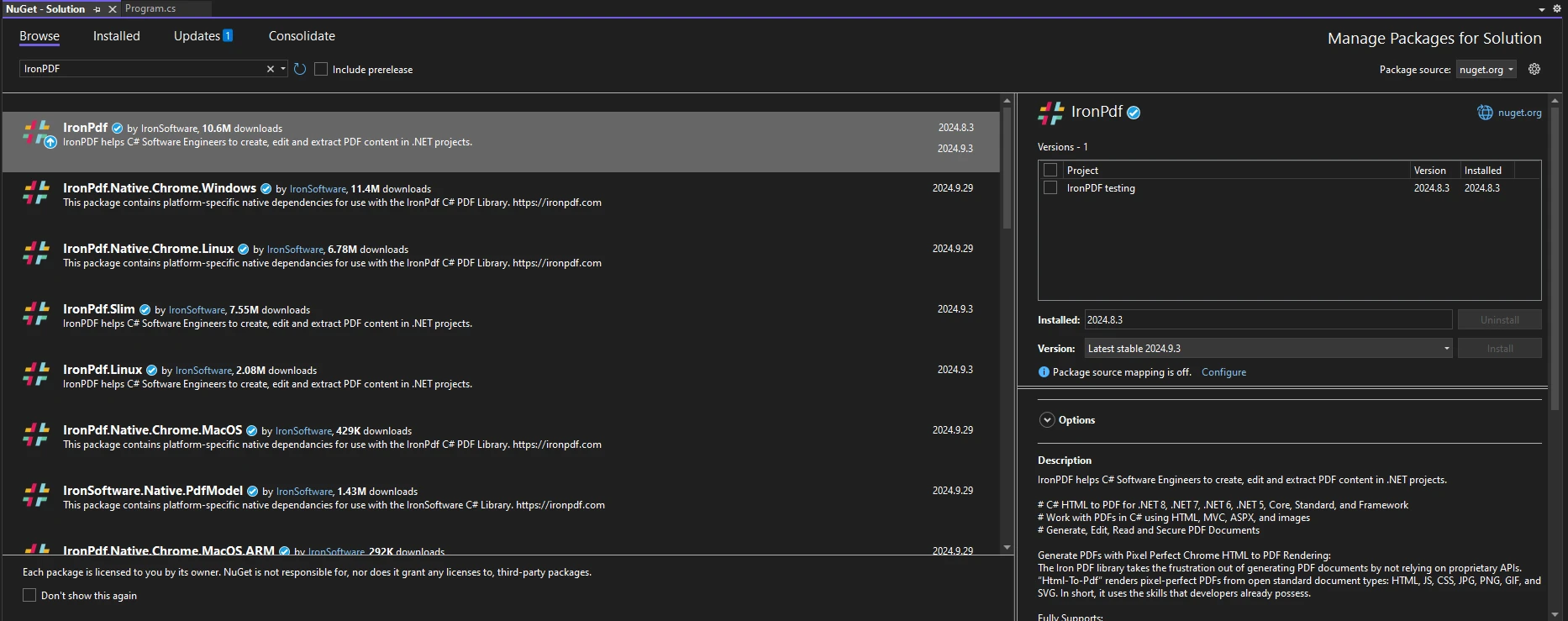
Once you have installed IronPDF, all you need to add to start using IronPDF is the correct using statement at the top of your code:
using IronPdf;using IronPdf;Using Global Variables to Generate PDFs with IronPDF
Global variables are particularly useful when you want to ensure consistency across multiple PDF documents. For example, if your PDF reports need to include the company name and logo on each page, you can store this data globally.
Here’s an example of how you can use such global variables to insert a company name and logo into every PDF generated by IronPDF:
using System;
using IronPdf;
public class GlobalSettings
{
// Static members of the global settings class
public static string CompanyName = "IronSoftware";
public static string LogoPath = "IronPdfLogo.png";
}
class Program
{
static void Main(string[] args)
{
// Create a Chrome PDF renderer
ChromePdfRenderer renderer = new ChromePdfRenderer();
// Define HTML content incorporating global variables
string htmlContent = $@"
<html>
<body>
<header>
<h1>{GlobalSettings.CompanyName}</h1>
<img src='{GlobalSettings.LogoPath}' />
</header>
<p>This is a dynamically generated PDF using global variables!</p>
</body>
</html>";
// Render HTML to PDF
PdfDocument pdf = renderer.RenderHtmlAsPdf(htmlContent);
// Save the PDF to file
pdf.SaveAs("globalVar.pdf");
}
}using System;
using IronPdf;
public class GlobalSettings
{
// Static members of the global settings class
public static string CompanyName = "IronSoftware";
public static string LogoPath = "IronPdfLogo.png";
}
class Program
{
static void Main(string[] args)
{
// Create a Chrome PDF renderer
ChromePdfRenderer renderer = new ChromePdfRenderer();
// Define HTML content incorporating global variables
string htmlContent = $@"
<html>
<body>
<header>
<h1>{GlobalSettings.CompanyName}</h1>
<img src='{GlobalSettings.LogoPath}' />
</header>
<p>This is a dynamically generated PDF using global variables!</p>
</body>
</html>";
// Render HTML to PDF
PdfDocument pdf = renderer.RenderHtmlAsPdf(htmlContent);
// Save the PDF to file
pdf.SaveAs("globalVar.pdf");
}
}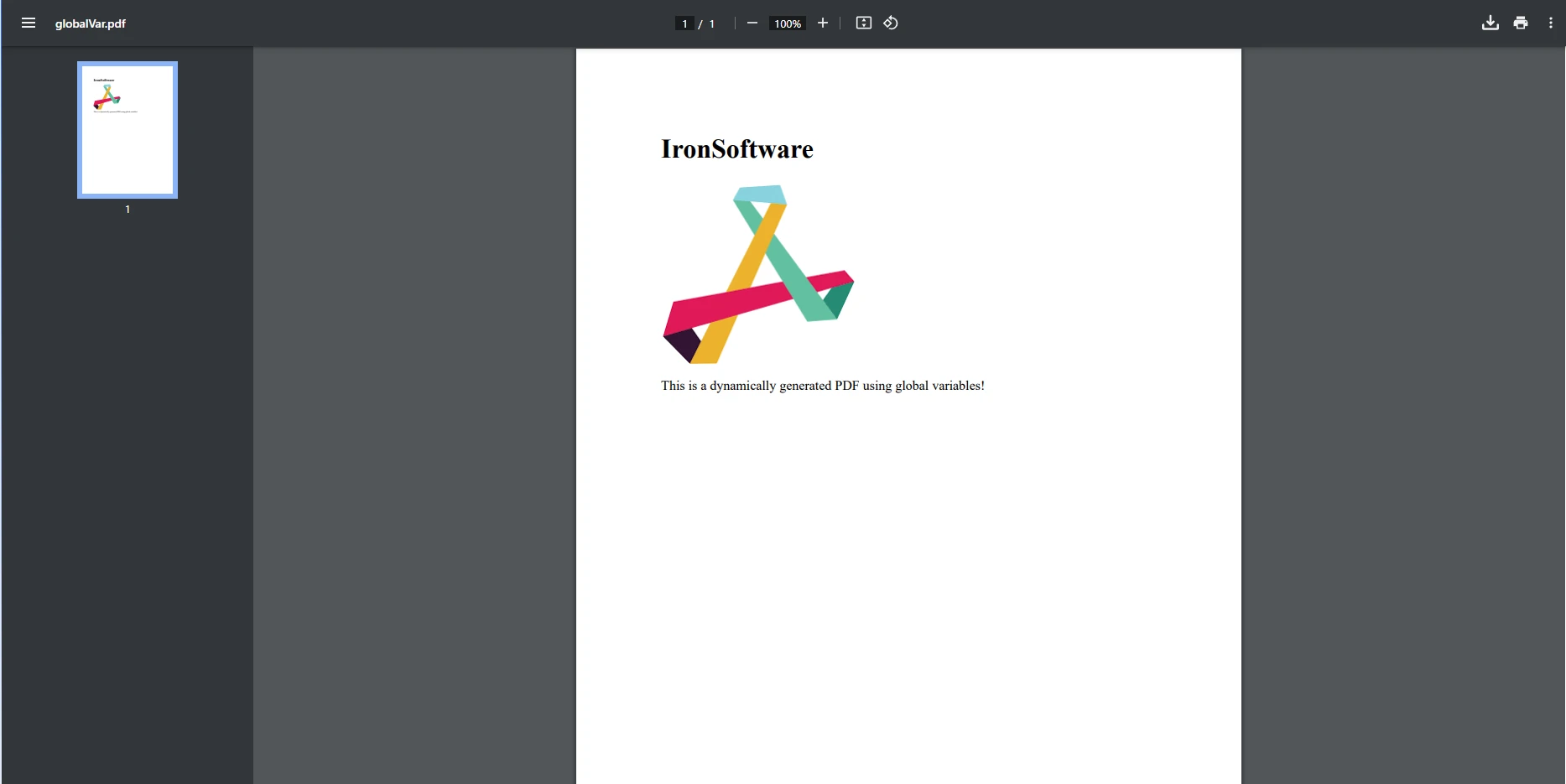
In this example, we instantiate the ChromePdfRenderer class to create a new renderer which we will be using to render our HTML content as a PDF. The HTML content includes our static global variables we created in the earlier example, CompanyName and LogoPath. We then use the RenderHtmlAsPdf method with our PdfDocument object to render the HTML content to PDF, before finally saving the resulting PDF.
Example: Dynamic PDF Generation Using Global Variables
Imagine a scenario where you want to generate financial reports, and you need to include your company’s branding on every report. By using global variables, you can store the company’s name, logo, and other relevant information and apply it consistently across all generated PDFs.
using System;
using IronPdf;
public class GlobalSettings
{
// Static variable types go here
public static string CompanyName = "IronSoftware";
public static string ReportContent { get; set; } = "This is the default report content.";
public static string FooterText = "Created using IronPDF and Global Variables";
}
public class PDFReport
{
// Method to dynamically set report content
public static void SetDynamicContent(string reportContent)
{
GlobalSettings.ReportContent = reportContent;
}
// Method to generate PDF report
public static void GenerateReport()
{
ChromePdfRenderer renderer = new ChromePdfRenderer();
// Using global variables in HTML content
string htmlTemplate = $@"
<html>
<body>
<header style='text-align:center;'>
<h1>{GlobalSettings.CompanyName}</h1>
</header>
<section>
<p>{GlobalSettings.ReportContent}</p>
</section>
<footer style='text-align:center;'>
<p>{GlobalSettings.FooterText}</p>
</footer>
</body>
</html>";
// Render HTML to PDF
PdfDocument pdf = renderer.RenderHtmlAsPdf(htmlTemplate);
// Save the PDF to file
pdf.SaveAs("dynamic_report.pdf");
}
}
class Program
{
static void Main(string[] args)
{
// Set global variables dynamically at runtime
PDFReport.SetDynamicContent("This report highlights the latest innovations in technology.");
// Generate the PDF report
PDFReport.GenerateReport();
}
}using System;
using IronPdf;
public class GlobalSettings
{
// Static variable types go here
public static string CompanyName = "IronSoftware";
public static string ReportContent { get; set; } = "This is the default report content.";
public static string FooterText = "Created using IronPDF and Global Variables";
}
public class PDFReport
{
// Method to dynamically set report content
public static void SetDynamicContent(string reportContent)
{
GlobalSettings.ReportContent = reportContent;
}
// Method to generate PDF report
public static void GenerateReport()
{
ChromePdfRenderer renderer = new ChromePdfRenderer();
// Using global variables in HTML content
string htmlTemplate = $@"
<html>
<body>
<header style='text-align:center;'>
<h1>{GlobalSettings.CompanyName}</h1>
</header>
<section>
<p>{GlobalSettings.ReportContent}</p>
</section>
<footer style='text-align:center;'>
<p>{GlobalSettings.FooterText}</p>
</footer>
</body>
</html>";
// Render HTML to PDF
PdfDocument pdf = renderer.RenderHtmlAsPdf(htmlTemplate);
// Save the PDF to file
pdf.SaveAs("dynamic_report.pdf");
}
}
class Program
{
static void Main(string[] args)
{
// Set global variables dynamically at runtime
PDFReport.SetDynamicContent("This report highlights the latest innovations in technology.");
// Generate the PDF report
PDFReport.GenerateReport();
}
}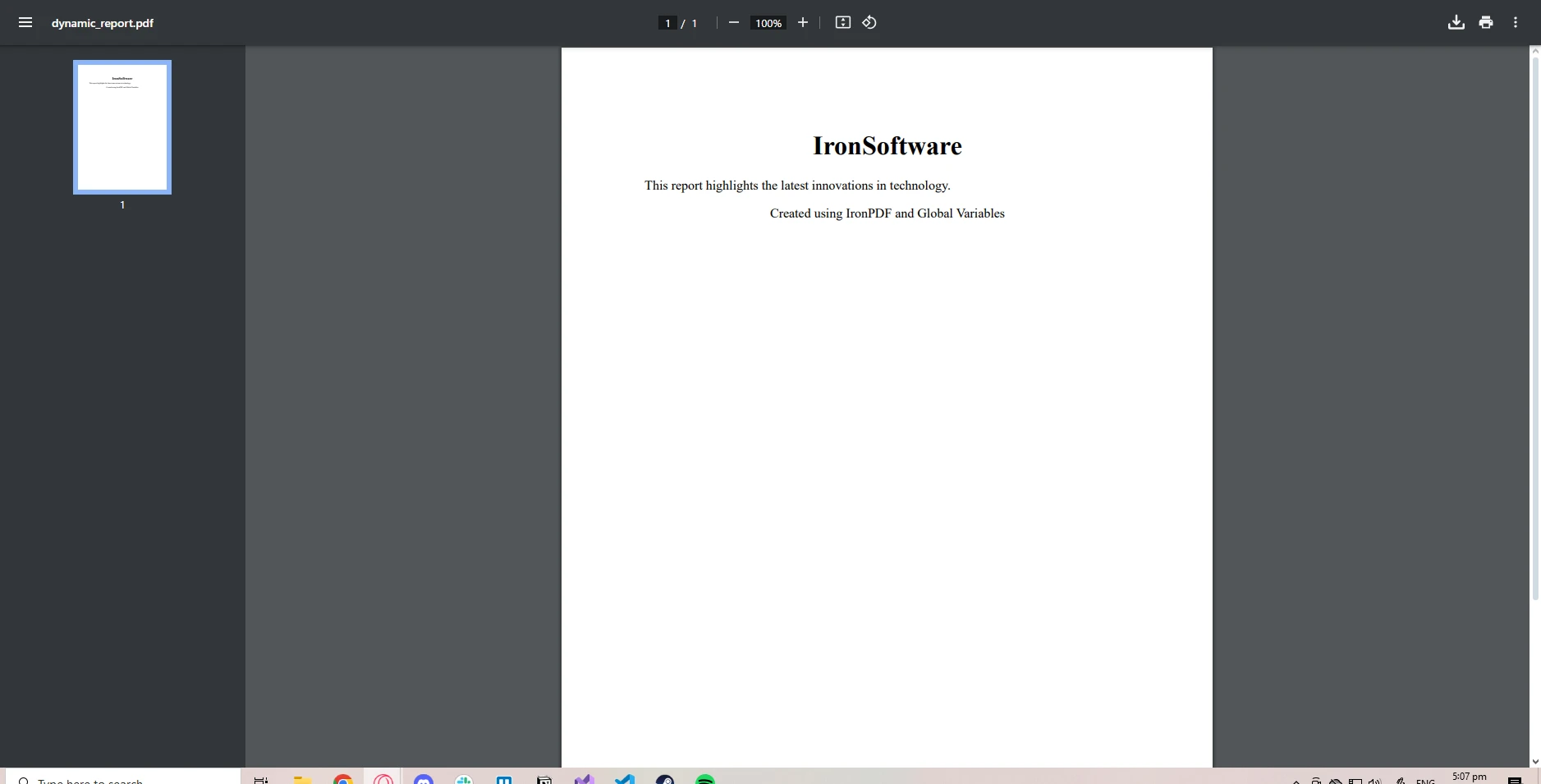
In this example, we have created a global variable in the GlobalSettings class called ReportContent. This has the get and set methods so that its values can be updated at runtime. The SetDynamicContent method allows the setting of the global variables dynamically before generating the PDF. This method could be extended to fetch data from a configuration file, database, or user input. The HTML content used to create the PDF is generated dynamically based on the values of the global variables.
Best Practices for Managing Global Variables in C# with IronPDF
When to Use Global Variables
Global variables are convenient but should only be used when they simplify the code and reduce redundancy. For example, using global variables for application settings, common resources, or constants in PDF generation can save time and prevent errors.
However, if your global data is prone to change or is only relevant in specific contexts, it’s better to pass data through method parameters or use dependency injection to ensure better code structure and maintainability.
Avoiding Common Pitfalls with Global Variables
Some common issues with global variables include tight coupling, which makes components dependent on one another, making it harder to test or modify the code. Here are some tips to avoid these pitfalls:
- Use readonly for constants: Mark static global variables as readonly if they should not be modified after initialization.
- Encapsulate global data in a singleton class: Use the singleton pattern to ensure controlled access to shared data.
Example: Optimizing PDF Generation by Storing Shared Resources Globally
Global variables can also store frequently used resources like file paths, data structures, templates, or image assets. By doing this, you optimize PDF generation, as these resources are cached and reused across different PDF reports.
using System;
using System.IO;
using IronPdf;
public class GlobalSettings
{
// Readonly global variables for shared resources
public static readonly string TemplatePath = "report.html";
public static readonly string ImageDirectory = "Images/";
}
public class PDFReport
{
// Generate a PDF report using a reusable template
public static void GenerateReport()
{
ChromePdfRenderer renderer = new ChromePdfRenderer();
// Read content from a template file
string templateContent = File.ReadAllText(GlobalSettings.TemplatePath);
// Render HTML to PDF
PdfDocument pdf = renderer.RenderHtmlAsPdf(templateContent);
// Save the PDF to file
pdf.SaveAs("templateReport.pdf");
}
}
class Program
{
static void Main(string[] args)
{
// Generate the PDF report
PDFReport.GenerateReport();
}
}using System;
using System.IO;
using IronPdf;
public class GlobalSettings
{
// Readonly global variables for shared resources
public static readonly string TemplatePath = "report.html";
public static readonly string ImageDirectory = "Images/";
}
public class PDFReport
{
// Generate a PDF report using a reusable template
public static void GenerateReport()
{
ChromePdfRenderer renderer = new ChromePdfRenderer();
// Read content from a template file
string templateContent = File.ReadAllText(GlobalSettings.TemplatePath);
// Render HTML to PDF
PdfDocument pdf = renderer.RenderHtmlAsPdf(templateContent);
// Save the PDF to file
pdf.SaveAs("templateReport.pdf");
}
}
class Program
{
static void Main(string[] args)
{
// Generate the PDF report
PDFReport.GenerateReport();
}
}Input Template
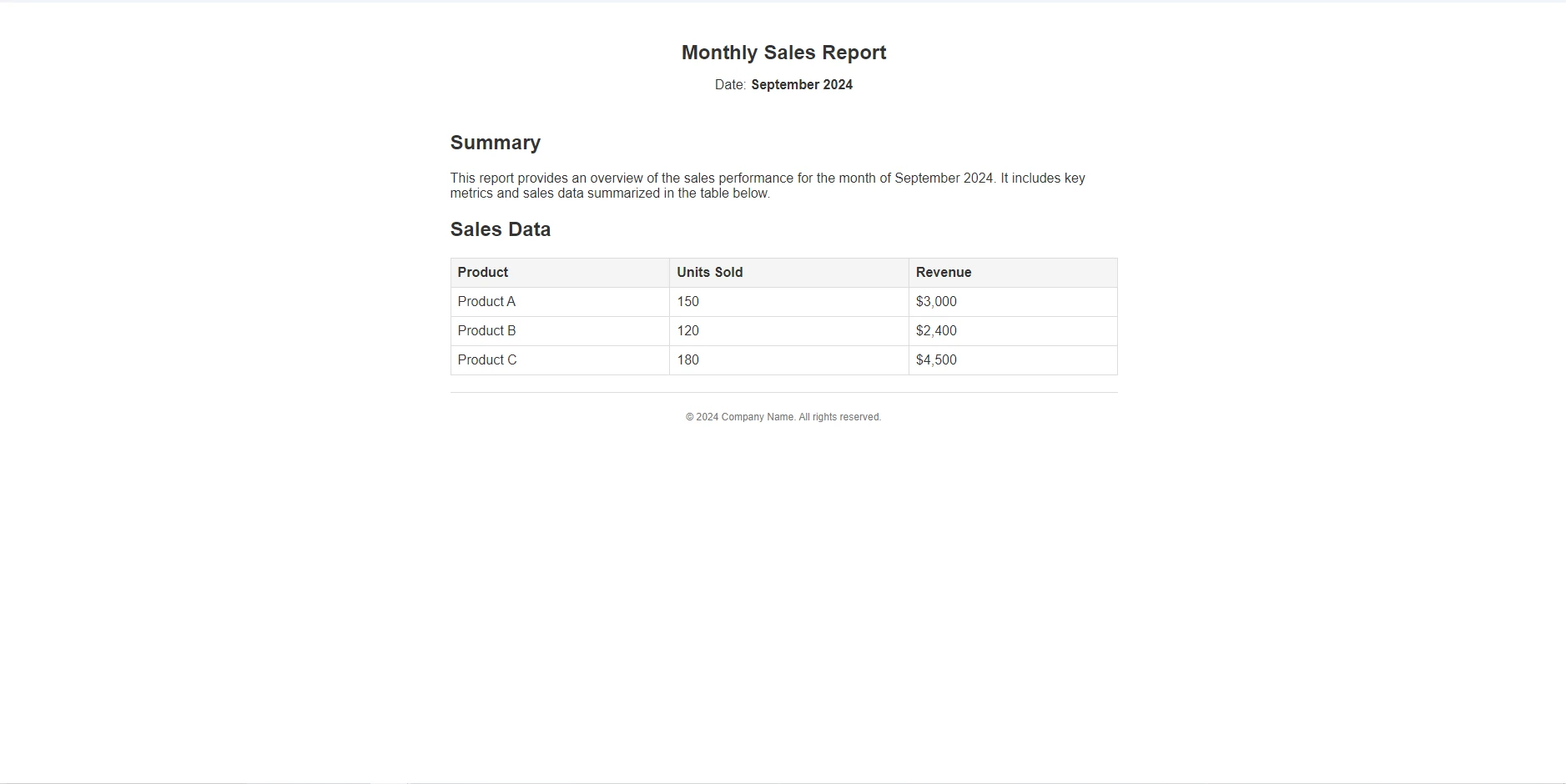
Output
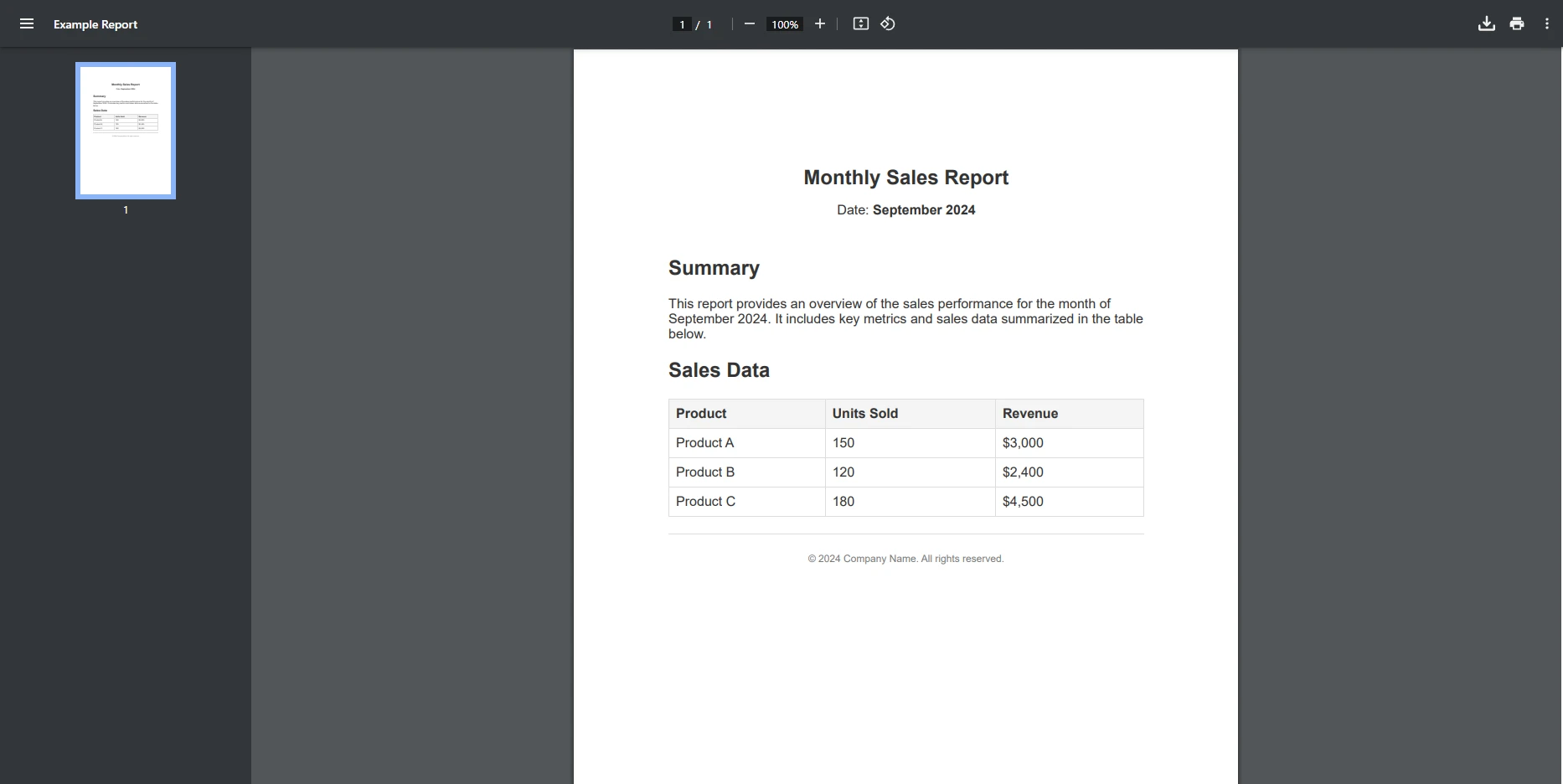
Why Use IronPDF for Data-Driven PDF Generation?
Key Features of IronPDF for Global Data-Based PDF Generation
IronPDF boasts a rich set of features, all of which make working with PDF documents a breeze and can handle everything from simple HTML to PDF conversion, to PDF Encryption and Decryption.
When it comes to working with data-driven PDF generation, IronPDF provides several features that simplify the process of generating these PDFs from global data:
- HTML to PDF Conversion: Convert dynamic HTML content into high-quality PDFs.
- Support for Global Configurations: Easily apply global settings like headers, footers, or styles across all PDFs.
- Dynamic Content Handling: Include global data in templates to generate customized reports.
Seamless Integration with .NET Applications and Global Variables
IronPDF integrates smoothly with .NET applications and supports the use of static data or configuration settings for consistent PDF generation. It’s a versatile library that adapts well to applications needing shared data for generating professional PDF documents. When combined with the power of global variables, you'll be able to streamline all your PDF generation tasks with IronPDF.
Conclusion
Global variables are an excellent way to manage shared data across an application, and they work seamlessly with IronPDF for IronPDF and see how it can streamline your PDF generation process today.
Frequently Asked Questions
How can I simulate global variables in C#?
In C#, you can simulate global variables using static variables, which belong to the class itself rather than any instance. They retain their value across multiple calls, making them suitable for storing data needed throughout the application.
What role do static variables play in C#?
Static variables in C# are associated with the class itself and not with any object instance. They maintain their state across method calls and can be used to store global data accessible throughout the application.
How does dependency injection help manage shared data in C#?
Dependency injection allows for controlled access to shared data by passing objects as dependencies. This design pattern helps manage shared data without relying on global variables, promoting a more modular and testable codebase.
What are the benefits of using a PDF generation library in .NET?
A PDF generation library like IronPDF offers features such as HTML to PDF conversion, dynamic content handling, and the ability to integrate global data like headers and branding elements, which are crucial for generating consistent and professional PDF documents.
How can global variables enhance PDF generation in C# applications?
In C# applications, global variables can store common resources like templates and branding elements, which can be reused across multiple PDF documents to ensure consistency and reduce redundancy during PDF generation using libraries like IronPDF.
What are the best practices for using global variables in C#?
Best practices include using readonly for constants, encapsulating global data in a singleton class, and limiting the use of global variables to cases where they simplify the code and avoid redundancy, ensuring better code maintainability.
How can I include dynamic content in PDFs using global variables?
You can leverage global variables to store dynamic content such as company names or financial data in a C# application. Using IronPDF, you can integrate these global variables into your PDF generation process to ensure that the content remains consistent and up-to-date.
What challenges might arise from using global variables?
Using global variables can lead to tight coupling between components, making it difficult to test or modify the code. This can result in a less modular application structure and increased complexity in managing state across the application.
Why should developers use constants over global variables in C#?
Constants in C# offer immutable compile-time values, providing a safer and more efficient alternative to global variables. They prevent accidental changes to data, ensuring stability and predictability in the application's behavior.


